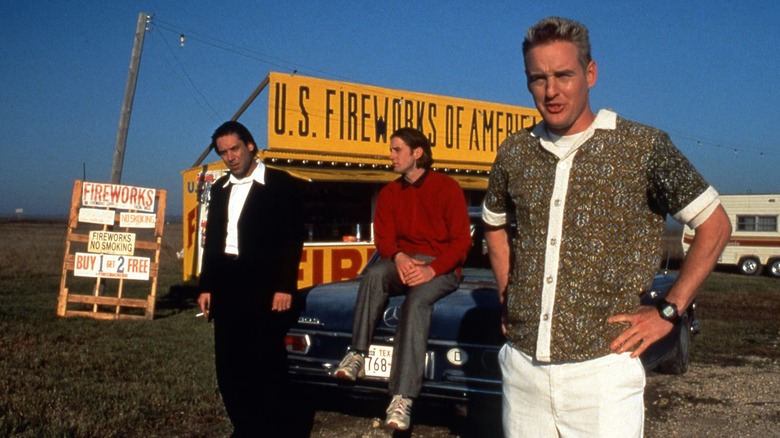Wes Anderson's Retelling Of Bottle Rocket's Premiere Is Like A Nightmare
Before Wes Anderson was a hit director with an uncanny visual style, an army of repeat actors, and a fanbase full of folks who dress like they're trying to get cast into their very own Anderson flick, he was just some guy trying to make a movie. When his first film "Bottle Rocket" debuted in 1996, Anderson and his stars Owen and Luke Wilson were all unknowns who were lucky enough to be playing around with a $5 million budget and a production deal with Columbia Records, all based on the strength of a short film they worked on together straight out of film school. While "Bottle Rocket" wouldn't quite hit audiences and characterize Anderson's specific style the way "Rushmore" would a few years later in 1998, it set the groundwork for the types of stories Anderson so clearly loves to tell. Whimsical, emotional films about oddballs and outcasts, swathed in a healthy dose of bright colors.
The film tells the story of a young man named Dignan (Owen Wilson) who breaks his best friend Anthony (Luke Wilson) out of a psychiatric unit as a part of his meticulous and also wildly shoddy plan to pull off a series of heists. Unsurprisingly, things get weird, someone falls in love, and the whole thing ends with the characters accidentally ending up right back where they started.
"Bottle Rocket" may have achieved cult status by the time Anderson really got cooking with "The Royal Tenenbaums," "The Fantastic Mr. Fox," and "The Grand Budapest Hotel," but Anderson's first screening of his first film was far from a dream. Instead, the director found himself starring down the barrel of a living nightmare, not dissimilar from the kind of classic nightmare where you realize you've been walking around in public without pants on. Just replace "out in public" with "at your own movie screening" and "not wearing pants" with "watching scores of people walk out of your movie."
As Anderson described it in an interview from the New York Public Library:
"I feel like I was never more confident in my life than when we made that film, and never less confident than when we screened it."
"The first time we screened it was part two of my life."
The way Anderson charmingly tells it, he had maximum confidence that his kooky heist movie would hit audiences in all of the right ways, despite the fact that some people around him were questioning whether or not audiences would the film's specific type of humor. Quickly into the screening, which Anderson claims felt like "part two" of his life from that point on, things started to go awry:
"Then we screened it ... in Santa Monica ... For an audience of 400 people, and as the reel was unspooled, I was sitting in the back row with all of he studio executives and everybody, and I began to see people leaving. And they were leaving in groups. People don't go to the bathroom in groups. They're not coming back. They take their coats."
Things got worse from there. Anderson himself joined the group of people leaving just so he could get some privacy while watching people walk right out of his first feature-length film:
"It became really excruciating. At a certain point, I left. I tried to be very discreet about it because I didn't want to add to the exodus feeling, but I also couldn't take it. I went up to the projection booth and watched, and they just left all through the film. It was really a miserable thing."
As Anderson sorted through the largely negative audience comment cards at the end of the film, it seemed like the screening could not have gone worse, until he discovered the one positive comment card of the bunch, written by a woman who seemed to completely understand Anderson's humor and style. The director had found his audience and would keep finding them as he honed that humor and style over the years. These days, Anderson isn't a director you take a bet on. You know before you walk into the theater what you're going to get and if you're going to like it, which isn't a bad thing. "Bottle Rocket" may have been a surprise, but Anderson knows what he's about now, and his audience does too.
